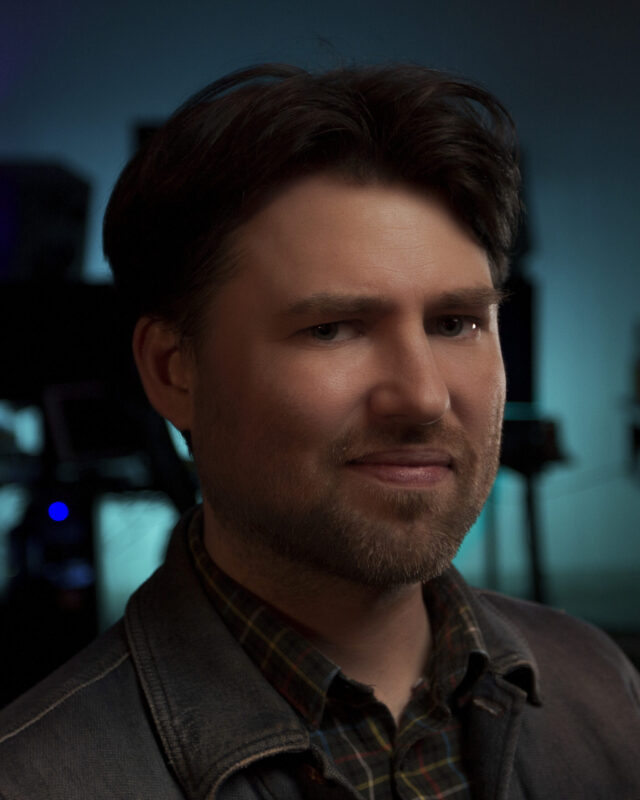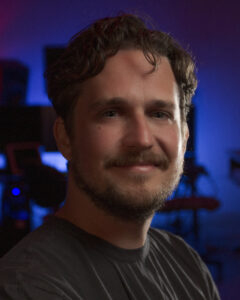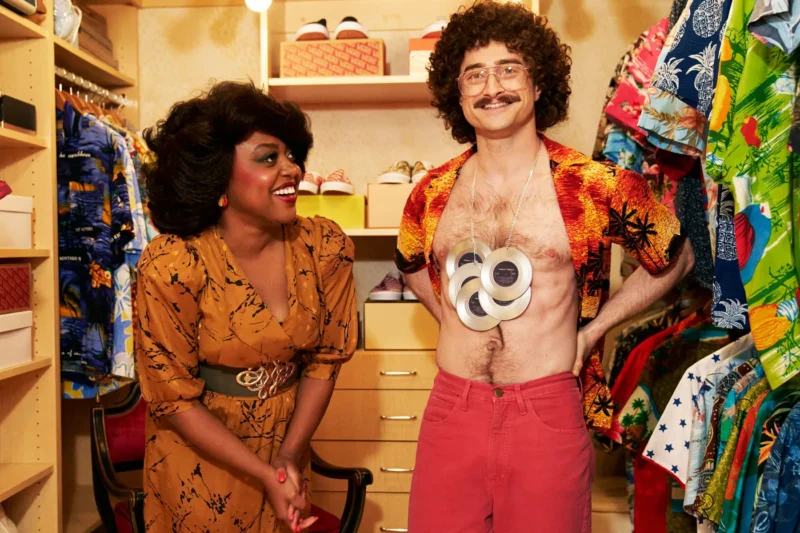By Patrick Z. McGavin
“Weird: The Al Yankovic Story” is as subversive as its pop-song parodist subject, who rode the MTV zeitgeist on his way to become a cultural phenomenon.
Expanded from a short fake trailer made by the comedian turned filmmaker Eric Appel, the movie has a blast charting the creative genesis of Weird Al’s hits like “My Bologna,” “Eat It,” and “Another One Rides the Bus.” Daniel Radcliffe has won acclaim for his portrayal of the frizzy-haired, accordion-pumping musical satirist.
The freewheeling form and style allowed main sound designer and sound editor Mike James Gallagher and supervising sound editor Anthony Vanchure a vast range of possibilities in constructing a versatile, dense and particular sound.
CineMontage: What drew you to work on this project?
Mike James Gallagher: The first thing that struck me, and what also got me excited, was the genre-hopping. It starts out at the crazy hospital scene, so we really took a lot of time to flush that out. Then there is this sound effect sequence where the whole movie rewinds. There’s a full-on fistfight, the polka party, and another scene where the dad smashes the accordion. That’s just reel one.
Everything just kept coming. I was struck by that immediately, and I knew it wasn’t going to be a walk in the park. I was excited to do so much stuff. That stayed with us for the whole movie.
Anthony Vanchure: From the very beginning, in talking with Weird Al and Eric, they wanted it to sound authentic and earnest. If Al is playing at a bar, we want it to sound like Al is playing at a bar. They did not want the sound to just be a dry recording. With each scene, the music is mixed to match the environment.
In the big arena scenes, we did a lot of work with the crowds to make it sound like we’re there with the audience, like it’s being performed in the arena. We were very fortunate to have Al with us in the mix, pointing us to how the music would be sounding. He’s been touring for more than 40 years. He’d say, “It would be bigger.” He always pointed us in the direction of how the music should be sounding.
Mike James Gallagher: Weird Al was all about the details. He re-recorded all the music so that we’d have all the stems for the mix. Every time the microphone left Daniel Radcliffe’s mouth for even a little bit, he wanted to make sure it all seemed real. All of his detailed music notes were pretty awesome.

Mike James Gallagher, sound editor. PHOTO: Courtesy Michael Gallagher.
CineMontage: How did you weave together all the disparate parts—dialogue tracks, performance tracks, music tracks, and also contrapuntal background resources like radio or video?
Anthony Vanchure: Very carefully. A big example of that is the “My Bologna” scene, where Al comes up with the lyrics. You have the music coming from the radio. You have his roommates all talking, and you have him opening the refrigerator, and formuling the ideas in his head. You have the score. It was a very delicate balance. We definitely did a lot of passes to make sure the radio is hitting right when you want it to, and the score is hitting right when you want it to, and then bam!, you’re back into Al’s head space when he hears the lyrics so you can hear his dialogue.
CineMontage: Did you make a point of researching a lot of the early videos, or did you want to come at the material in a fresh way?
Anthony Vanchure: It was very hard for me to not want to go back. I grew up a Weird Al fan. About 10 years ago, I dressed up as Weird Al for Halloween.
Mike James Gallagher: For me, this is like one of my first memories of sitting around with my family and waiting for the premiere of Weird Al’s “I’m Fat.” That was one of the first ones I went back to once I got the job. That video is full of the most ridiculous, silly sound effects, all in one place, that you ever heard. It was a fun way to start this creative journey, because it’s not at all what we did.
CineMontage: How did you calibrate your work to fit the greater scope as the performance goes from intimate settings to major arenas?
Anthony Vanchure: It was based on what Eric and Al were looking for with those scenes. The bar example was perfect. They were like, “This is a dive bar, with bikers, and angry people,” or what they called the heroin and whisky crowd.” We made sure to make that bar sound. We had a fist fight in the beginning.

Anthony Vanchure, sound editor. PHOTO: Courtesy Anthony Vanchure.
We wanted to make the bar sound as uninviting as possible. During the performance, the crowd turns, and they love Weird Al. They start singing along. It was important that we created this tonal shift from an angry bar crowd to actually loving Al.
It was actually my birthday back in July. We had a barbecue. Mike and I said, “You know what would be great if we recorded all of our friends singing along to ‘I Love Rocky Road,’ to really help sell the scene. We got them in my garage, and we recorded them signing along to the song. Mike did a great job of cutting that back into all the sounds that we had, making it a grand sequence of sound.
CineMontage: Weird Al helped write the script, and he acts in the film. Is it true he contributed directly to the mix?
Mike James Gallagher: In the big performance scene, the “Like a Surgeon,” performance, Daniel Radcliffe is yelling out questions to the crowd and they’re all yelling back to him, “No.” This was a stadium full of people. We were in the middle of the mix, and we still didn’t have that “No,” sound. We weren’t sure what we were going to do. We were going to use a plug-in, or loop group stuff, but it wasn’t big enough. Anthony just kind of threw out while Al was on the line.
He said, “Al, do you think you could record your crowd tonight?” Al was in Nebraska performing that night. Al chimed in. “Was that a serious request?” He got so excited about recording the crowd. He went and recorded the crowd screaming, “No.” He even said, “I’m going to get like five different levels of reactions from them.” It made the local news the next morning in Nebraska. “Weird Al makes local crowd movie stars.”
CineMontage: A lot of what you are describing makes the process sound very serendipitous.
Mike James Gallagher: I have a story about the comedic sound. Al’s mentor Dr. Demento (Rainn Wilson) is trying to adopt Weird Al at the end of the movie. When Al walks away, he squeezes his bicycle horn very slowly and makes this very sad sound. The very first thing I did with that was put in this slide whistle.
That’s probably what they’re going for. It was immediately thrown out. I wondered what we were going to do, maybe trumpets or trombones. Everything was rejected. Up until that point, Eric and Al were so game for all the crazy things we were bringing to the movie as far as sound effects.
This was hitting them the wrong way. Apparently during the temp offline edit, they had thrown in dog toy sounds. The picture editor, Jamie Kennedy, who was great to work with, said we should use her dog’s toy. We recorded that. I said, “That’s genius.” I went home, and recorded a bunch of dog toy sounds to create that noise. It was finally approved, and everybody applauded. You never realize what is going to be the sound that is the trickiest to get.
CineMontage: The time frame was the early 1970s to the mid-80s. Have the sounds of accordions changed a lot?
Anthony Vanchure: You obviously want to play your sounds for the moment that you’re in. Most of the accordion stuff was given to us by Al. Accordions now have synthesizers, and you can do crazy sound effects. We’re playing the classic accordion sounds.
Mike James Gallagher: There is so much accordion instruction, I have this library for pro sound effects. There are all of these dissonant accordion hits, and it was really useful because the accordion gets smashed on stage, it gets smashed by his dad. I was just searching for accordions in my library.
CineMontage: How did you first meet?
Anthony Vanchure: Mike and I met at this monthly video event called Channel 101. Each week people submit their five-minute video for their idea of a TV show. It was a very communal event. You’d go to these theaters, watch the videos, laugh and have a good time. We had a mutual friend, and we just hit it off.
CineMontage: Is your creative partnership hands on, or is it more intuitive?
Anthony Vanchure: It’s both. Mike is an amazing editor. He has great ideas, and then we sit and review and watch things together, and then we just ask ourselves what we can do to make it better, or what’s missing. It’s a very collaborative relationship. It helps that we’re good friends.
Mike James Gallagher: Anthony and I generally have the same taste in comedy, movies, and pop culture in general. That is an asset. He knows all of my references, and I know all of his references. It all comes together very easily. I’d say that is the intuitive part. As far as hands on, he comes over to my studio and we go over stuff. We hang out. We have drinks together, and talk about work.
CineMontage: Cinematographers have an eye, editors a touch or feel. Do you have a particular ear, or sense of sound?
Anthony Vanchure: You have to. I don’t really think about it. I don’t want to say it comes naturally to me. If a script gets sent to me, sounds are already just playing in my head, “This would be a good idea to do this, or this.” That comes in line with editing.
Mike James Gallagher: It’s a good question. It’s all subjective. There was a scene where Weird Al or someone else picks up the accordion. I went looking for some accordion percussion sounds in the library.
I popped it in. At the time, I just thought, no big deal. I just remember when Al picked up the accordion on stage, me and Anthony just looked at each other and said, “That was perfect.” It was the tiniest sound, but we knew that it was just perfect.
Patrick Z. McGavin is a Chicago writer and cultural journalist. He maintains the Substack blog “Shadows and Dreams” (www.patrickzmcgavin.substack.com).


